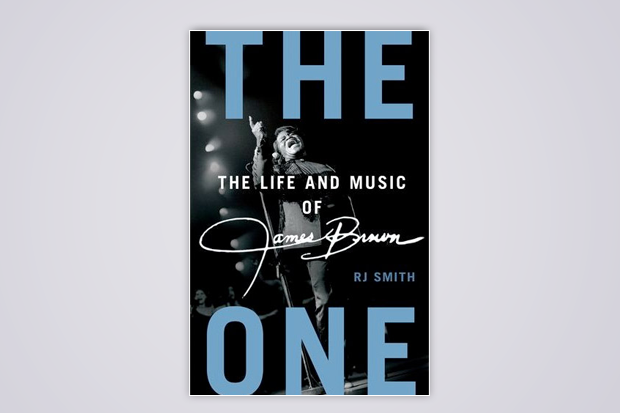The career of the 20th century’s greatest American musician has been eclipsed by the wretched image of the final years of his life: an incoherent, drugged-up bully, reduced to embarrassing self-parody. But for close to 20 years, James Brown was an unstoppable force, changing the face of music again and again. He was an artistic genius who yanked the fundamental structure of the song inside out, an entrepreneur who dragged himself up from horrifying poverty to wealth and comfort by sheer blood-spattered force of will and a flabbergasting work ethic, a black revolutionary whose idea of what a “black revolutionary” should be was his and no one else’s. Of course, his ego was unimaginably immense: He’d never have survived otherwise, much less accomplish what he did.
There have been a few biographies of Brown published in recent decades, and Brown’s name appeared on two different autobiographies. (The first, 1986’s The Godfather of Soul, is worth reading.) But RJ Smith is really the first to do it right. Smith, author of The Great Black Way, a history of Central Avenue, African American Los Angeles’ cultural hub from the 1920s into the ’50s, spent three years researching The One: The Life and Music of James Brown (Gotham), interviewing more than a hundred of Brown’s associates and digging through numerous historical documents. He tells the stories that J.B. himself couldn’t or wouldn’t, debunks a handful of the tall tales that arose around him, and makes the scope of the Godfather’s achievement clear. (Full disclosure: Smith cites a couple of pieces I’ve written.)
Smith’s title shifts its meaning over the course of the book. It could be The One as in “the chosen one”: Brown always saw himself as uniquely glorious, a leader and spokesman for his people, and in his later years sometimes compared himself to Moses without a hint of irony. It could be “the one,” as in the great rhythmic shift that Brown commanded when he invented funk with his string of mid-’60s hits, including “Papa’s Got a Brand New Bag” and “Cold Sweat.” Or it could be “the one,” as in the almighty dollar bill, in whose power Brown never lost faith, and which he never made a secret of chasing. (In the early ’70s, his children made a plaque for his house that read, “THE GOLDEN RULE is as follows: Who ever has the gold makes the rules. Who has the gold? DADDY. Everyone is in agreement that DADDY sets the rules in this home.”)
Brown’s idea of what to do with the gold was curious, though. His battles over money with record labels, band members, and the IRS went to ridiculous extremes. When he jetted off at the end of one tour without paying his band, bassist “Sweet” Charles Sherrell took the tour bus and equipment truck hostage, then led the group out to play more gigs in sunny climates under an assumed name until the boss finally coughed up. DJs, on the other hand, always came to his shows, because if they hung around afterward, someone would eventually come out to hand them an envelope full of cash. Not to play any particular record, mind you — just to, you know, maintain good relations. This may have had something to do with how Brown remained a near-permanent fixture on the R&B charts for years.
The One presents a version of Brown as a tough guy among tough guys — he grew up in a brothel and served three years in prison before he started to sing professionally — and as a rogue who drew other rogues to him. The lawyer who helped Brown compose his will, Smith writes wryly, “was later best known for murdering a strip-club employee, for which he received a 30-year sentence in 2006. Assisting Brown in this period was probate attorney Strom Thurmond Jr., best known for being Strom Thurmond Jr.” There’s a lot of amusing dirt about Brown’s love life here, too. From his ascent to fame onward, Smith asserts, the man apparently never spent a night alone. (A camera guy for The T.A.M.I. Show, the 1964 concert film in which Brown makes everyone from the Rolling Stones to Marvin Gaye look like fidgety amateurs, is quoted: “I can’t be right, but I think I’m hearing ‘fuck me, fuck me, fuck me’ from the audience.”) The Godfather’s comfort in the years before his 2006 death, it turns out, was as much Viagra as PCP.
Smith is very sharp on the subject of Brown’s engagement with the political world, and how that world tried to deal with him as a powerful black Southerner who’d experienced brutal oppression firsthand and refused to sugarcoat his opinions about economic justice. Brown’s politics were as unpredictable as they were fierce — he endorsed Hubert Humphrey in 1968, then Richard Nixon in 1972, and responded to Watergate by releasing “You Can Have Watergate but Gimme Some Bucks and I’ll Be Straight.”
The One doesn’t delve quite as deeply into how Brown made his music, onstage and in the studio. Smith includes fascinating analyses of how a few landmark hits, like “Please, Please, Please” and “There Was a Time,” came together, but glosses over the disappointing final decades of J.B.’s life, without really explaining how the innovator who seemed to be reinventing funk yet again in 1974 — the miraculous year of “The Payback,” “My Thang,” “Papa Don’t Take No Mess,” and “Funky President” — abruptly lost his touch by the middle of 1975 and only offered intermittent flickers of the old white-hot power thereafter.
Still, The One is packed with illuminating quotes from musicians who played with Brown for years or even decades, perpetually keeping their eyes on him for split-second cues that they could be fined for missing. The Godfather of Soul once had been poor, helpless, and in chains; for the rest of his life, he fought to make sure that no one would ever have any power over him again. “Control I must have,” he said, “of everything, of myself. Either that or I can’t give you James Brown.”
This story originally appeared in the May/June 2012 issue of SPIN.





